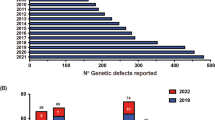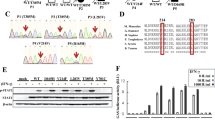Abstract
Purpose
Isolated adrenocorticotropic hormone deficiency is a rare disease; however, since immune check point inhibitors (ICIs) have become widely used, many more cases have been reported. In this study, we compared the human leukocyte antigen (HLA) signatures between ICI-induced isolated adrenocorticotropic hormone deficiency (IAD) and idiopathic IAD (IIAD).
Design and methods:
Clinical features and HLA frequencies were compared among 13 patients with ICI-induced IAD, 8 patients with IIAD, and healthy controls. HLA frequencies of healthy controls were adopted from a HLA database of Japanese population.
Results
Age and body mass index were higher, while the rate of weight loss was lower, in patients with ICI-induced IAD than in those with IIAD. No HLA alleles had a significantly higher frequency in patients with ICI-induced IAD than in healthy controls, whereas the frequencies of HLA-DRB1*09:01, HLA-DQA1*03:02, and DQB1*03:03 were significantly higher in patients with IIAD than in healthy controls.
Conclusions
ICI-induced IAD and IIAD were different in terms of HLA frequencies. There were no specific HLAs related to ICI-induced IAD, whereas several HLAs in strong linkage disequilibrium were associated with IIAD. This might suggest that the two diseases have different pathological mechanisms. HLAs unique to IIAD may be helpful in predicting its pathophysiology.
Similar content being viewed by others
References
Postow MA, Robert Sidlow MD, Hellmann MD (2018) Immune-related adverse events associated with immune checkpoint blockade. N Engl J Med 378:158–168
Bajwa R, Cheema A, Khan T, Amirpour A, Paul A, Chaughtai S, Patel S, Patel T, Bramson J, Gupta V, Levitt M, Asif A, Hossain MA (2019) Adverse effects of immune checkpoint inhibitors (programmed death-1 inhibitors and cytotoxic T-lymphocyte-associated protein-4 inhibitors): Results of a retrospective study. J Clin Med Res 11:225–236
Min L, Hodi FS, Giobbie-Hurder A, Ott PA, Luke JJ, Donahue H, Davis M, Carroll RS, Kaiser UB (2015) Systemic high-dose corticosteroid treatment does not improve the outcome of ipilimumab-related hypophysitis: a retrospective cohort study. Clin Canser Res 21:749–755
Barroso-Sousa R, Barry WT, Garrido-Castro AC, Hodi FS, Min L, Krop IE, Tolaney SM (2018) Incidence of endocrine dysfunction following the use of different immune checkpoint inhibitor regimens: A systematic review and meta-analysis. JAMA Oncol 4:173–182
Garon EB, Rizvi NA, Hui R, Leighl N, Balmanoukian AS, Eder JP, Patnaik A, Aggarwal C, Gubens M, Horn L, Carcereny E, Ahn MJ, Felip E, Lee JS, Hellmann MD, Hamid O, Goldman JW, Soria JC, Dolled-Filhart M, Rutledge RZ, Zhang J, Lunceford JK, Rangwala R, Lubiniecki GM, Roach C, Emancipator K, Gandhi L (2015) Pembrolizumab for the treatment of non-small-cell lung cancer. N Engl J Med 372:2018–2028
Sherlock M, Ayuk J, Tomlinson JW, Toogood AA, Aragon-Alonso A, Sheppard MC, Bates AS, Stewart PM (2010) Mortality in patients with pituitary disease. Endocr Rev 31:301–342
Escobar-Morreale H, Serrano-Gotarredona J, Varela C (1994) Isolated adrenocorticotropic hormone deficiency due to probable lymphocytic hypophysitis in a man. J Endocrinol Invest 17:127–131
Agha A, Sherlock M, Brennan S, O’Connor SA, O’Sullivan E, Rogers B, Faul C, Rawluk D, Tormey W, Thompson CJ (2005) Hypothalamic-pituitary dysfunction after irradiation of nonpituitary brain tumors in adults. J Clin Endocrinol Metab 90:6355–6360
Hannon MJ, Crowley RK, Behan LA, O’Sullivan EP, O’Brien MM, Sherlock M, Rawluk D, O’Dwyer R, Tormey W, Thompson CJ (2013) Acute glucocorticoid deficiency and diabetes insipidus are common after acute traumatic brain injury and predict mortality. J Clin Endocrinol Metab 98:3229–3237
Hannon MJ, Behan LA, O’Brien MM, Tormey W, Ball SG, Javadpour M, Sherlock M, Thompson CJ (2014) Hyponatremia following mild/moderate subarachnoid hemorrhage is due to SIAD and glucocorticoid deficiency and not cerebral salt wasting. J Clin Endocrinol Metab 99:291–298
Couture C, Saveanu A, Barlier A, Carel JC, Fassnacht M, Flück CE, Houang M, Maes M, Phan-Hug F, Enjalbert A, Drouin J, Brue T, Vallette S (2012) Phenotypic homogeneity and genotypic variability in a large series of congenital isolated ACTH-deficiency patients with TPIT gene mutations. 97:E486–E495
Krude H, Biebermann H, Gruters A (2003) Mutations in the human proopiomelanocortin gene. Ann N Y Acad Sci 994:233–239
Yamamoto T, Kamoi K (2008) Prevalence of maturity-onset isolated ACTH deficiency (IAD) in 2005: Japanese cohort studies. Endocr J 55:939–941
Hannon AM, Hunter S, Smith D, Sherlock M, O’Halloran D, Thompson CJ, Irish Pituitary Database Group (2018) Clinical features and autoimmune associations in patients presenting with idiopathic isolated ACTH deficiency. Clin Endocrinol (Oxf) 88:491–497
Matzaraki V, Kumar V, Wijmenga C, Zhernakova A (2017) The MHC locus and genetic susceptibility to autoimmune and infectious diseases. Genome Biol 18:76
Chihara K, Shimatsu A, Hizuka N, Tanaka T, Seino Y, Katofor Y, KP-102 Study Group (2007) A simple diagnostic test using GH-releasing peptide-2 in adult GH deficiency. Eur J Endocrinol 157:19–27
Sugiura M, Hashimoto A, Shizawa M, Tsukada M, Maruyama S, Ishido T, Kasahara T, Hirata Y (1986) Heterogeneity of anterior pituitary cell antibodies detected in insulin-dependent diabetes mellitus and adrenocorticotropic hormone deficiency. Diabetes 3:111–114
HLA LABORATORY, Japan INC (2021) https://hla.or.jp/med/frequency_search/en/allele/. Accessed 1
Japanese Society for Histocompatibility and Immunogenetics (2021) http://jshi.umin.ac.jp/standarization/file/JSHI-hyokiallele-2021list.pdf Accessed 1
Kasperlik-Załuska AA, Czarnocka B, Czech W (2003) Autoimmunity as the most frequent cause of idiopathic secondary adrenal insufficiency: report of 111 cases. Autoimmunity 36:155–159
Murakami T, Wada S, Katayama Y, Nemoto Y, Kugai N, Nagata N (1993) Thyroid dysfunction in isolated adrenocorticotropic hormone (ACTH) deficiency: case report and literature review. Endocr J 40:473–478
Inaba H, Ariyasu H, Iwakura H, Ueda Y, Kurimoto C, Uraki S, Takeshima K, Yamaoka H, Furukawa Y, Morita S, Nishi M, Akamizu T (2019) Comparative analysis of human leucocyte antigen between idiopathic and anti-PD-1 antibody induced isolated adrenocorticotropic hormone deficiency: A pilot study. Clin Endocrinol (Oxf) 91:786–792
Yano S, Ashida K, Sakamoto R, Sakaguchi C, Ogata M, Maruyama K, Sakamoto S, Ikeda M, Ohe K, Akasu S, Iwata S, Wada N, Matsuda Y, Nakanishi Y, Nomura M, Ogawa Y (2020) Human leucocyte antigen DR15, a possible predictive marker for immune checkpoint inhibitor-induced secondary adrenal insufficiency. Eur J cancer 130:198–203
Kobayashi T, Iwama S, Sugiyama D, Yasuda Y, Okuji T, Ito M, Ito S, Sugiyama M, Onoue T, Takagi H, Hagiwara D, Ito Y, Suga H, Banno R, Nishikawa H, Arima H(2021) : Anti-pituitary antibodies and susceptible human leukocyte antigen alleles as predictive biomarkers for pituitary dysfunction induced by immune checkpoint inhibitors. J Immunother Cancer. 9, e002493
Caturegli P, Di Dalmazi G, Lombardi M, Grosso F, Larman HB, Larman T, Taverna G, Cosottini M, Lupi I (2016) Hypophysitis secondary to cytotoxic T-lymphocyte-associated protein 4 blockade: Insights into pathogenesis from an autopsy series. Am J Pathol 186:3225–3235
Mei Y, Bi WL, Greenwald NF, Du Z, Agar NY, Kaiser UB, Woodmansee WW, Reardon DA, Freeman GJ, Fecci PE, Laws ER Jr, Santagata S, Dunn GP, Dunn IF (2016) Increased expression of programmed death ligand 1 (PD-L1) in human pituitary tumors. Oncotarget 7:76565–76576
Mihic-Probst D, Reinehr M, Dettwiler S, Kolm I, Britschgi C, Kudura K, Maggio EM, Lenggenhager D, Rushing EJ (2020) The role of macrophages type 2 and T-regs in immune checkpoint inhibitor related adverse events. Immunobiology 225:152009
Kawabata Y, Ikegami H, Awata T, Imagawa A, Maruyama T, Kawasaki E, Tanaka S, Shimada A, Osawa H, Kobayashi T, Hanafusa T, Tokunaga K, Makino H (2009) Committee on type 1 diabetes, Japan diabetes society. Differential association of HLA with three subtypes of type 1 diabetes: fulminant, slowly progressive and acute-onset. Diabetologia 52:2513–2521
Katahira M, Ishiguro T, Segawa S, Kuzuya-Nagao K, Hara I, Nishisaki T (2008) Reevaluation of human leukocyte antigen DR-DQ haplotype and genotype in type 1 diabetes in the Japanese population. Horm Res 69:284–289
Hashimoto K, Maruyama H, Nishiyama M, Asaba K, Ikeda Y, Takao T, Iwasaki Y, Kumon Y, Suehiro T, Tanimoto N, Mizobuchi M, Nakamura T (2005) Susceptibility alleles and haplotypes of human leukocyte antigen DRB1, DQA1, and DQB1 in autoimmune polyglandular syndrome type III in Japanese population. Horm Res 64:253–260
Miyadera H, Ohashi J, Lernmark Ã, Kitamura T, Tokunaga K (2015) Cell-surface MHC density profiling reveals instability of autoimmunity-associated HLA. J Clin Invest 125:275–291
Heaney AP, Sumerel B, Rajalingam R, Bergsneider M, Yong WH, Liau LM (2015) HLA markers DQ8 and DR53 are associated with lymphocytic hypophysitis and may aid in differential diagnosis. J Clin Endocrinol Metab 100:4092–4097
Author information
Authors and Affiliations
Contributions
Ono M and Fukuda I designed the study. Ono M extracted the data and performed the statistical analysis. Ono M and Fukuda I wrote the manuscript. Nagao M, Tomiyama K, Okazaki-Hada M, Shuto Y, Kobayashi S, Yuji Y, Nagamine T, Nakajima Y, and Inagaki-Tanimura K contributed to the care of the patients and acquisition of the data. Sugihara H critically reviewed the article.
Corresponding author
Ethics declarations
Statements and declarations
The authors have no relevant financial or non-financial interests to disclose.
Additional information
Publisher’s note
Springer Nature remains neutral with regard to jurisdictional claims in published maps and institutional affiliations.
Rights and permissions
About this article
Cite this article
Ono, M., Fukuda, I., Nagao, M. et al. HLA analysis of immune checkpoint inhibitor-induced and idiopathic isolated ACTH deficiency. Pituitary 25, 615–621 (2022). https://doi.org/10.1007/s11102-022-01231-1
Accepted:
Published:
Issue Date:
DOI: https://doi.org/10.1007/s11102-022-01231-1




